AL RAYYAN, Qatar — Cut from the ill-fated 1998 World Cup team and living in the Netherlands while playing in the Eredivisie, Gregg Berhalter was hired that summer to do some match commentary by Dutch broadcaster NOS.
His assignment: the France '98 group-stage showdown between the United States and Iran, geopolitical rivals contesting what was essentially an elimination game after each lost its tournament opener.
More than two decades later, Berhalter still remembers Iran’s 2–1 victory vividly.
“That game just sticks in my mind. It burns in my mind,” the U.S. men’s national team coach said here Monday on the eve of a high-stakes rematch.
“What I saw from the opening whistle is one team that really wanted to win the game and one team that didn't really want to win the game. Iran wanted to win the game with everything, and they played really committed, really focused,” he recalled. “I didn’t think we were up to it on that night—the United States wasn’t. It just shows what type of commitment you need to win a game at the World Cup.”
This competition, this spotlight, these stakes—they all combine to ask something unique of everyone who enters this quadrennial crucible. The narratives are broad and sweeping. And the results linger, often defining programs and generations.
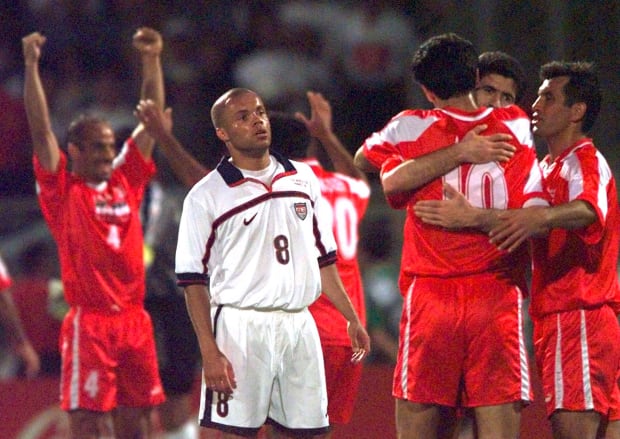
Denis Doyle/AP
World Cup matches are difficult, heated and, from an American perspective, almost always decided by razor-thin margins. Every bit of commitment and focus matters. So far here in Qatar, a U.S. side that featured the two youngest starting lineups at this World Cup through Sunday (and that’s with 35-year-old defender Tim Ream on the field), has displayed enough quality and composure to stay alive. Although the finishing was flawed during draws against Wales and England, the cohesion and effort were evident. The Americans carried the play in both games for significant stretches.
So the climax to that unresolved story, and to nearly four years of building, planning, trial and error—a do-or-die test of all those aforementioned World Cup qualities—is now scheduled for Tuesday night at the Al Thumama Stadium just south of downtown Doha. As in 1998, the U.S. (0-0-2) is playing Iran (1-1-0) for its World Cup future. Win, and the success-or-failure, binary objective of reaching the round of 16 will be achieved. Lose or draw, and a beguiling chapter of U.S. soccer history will end abruptly. Berhalter’s mandate will be undermined (his contract expires at year’s end), and this talented and ambitious generation will be starting over with the North American World Cup just four years away.
“That's our business—our job,” Berhalter said. “We said that this team is going to be judged on what we do at the World Cup. So that's fine. We'll deal with it.”
But the fantasy or finality of Tuesday’s game isn’t all they’re dealing with. The demands on players from both sides to ignore the increasing din and focus on the fraught task at hand have risen to bizarre and near-unprecedented levels. The intrigue that would’ve inevitably surrounded U.S.-Iran exploded this weekend thanks to an own goal by U.S. Soccer, which temporarily altered Iran’s flag in a few social media posts as a gesture of support to women campaigning for equal rights under the country’s theocratic regime. Crackdowns on protesters following the September death of Mahsa Amini, a women arrested for allegedly violating Iran’s hijab policy, have killed hundreds.
The gesture was well-meaning, but it was mistimed, clumsy and appeared to accomplish little but infuriating the Iranian press corps. Monday's “match day minus one” scene at the Qatar National Convention Centre was tense and surreal. Berhalter and U.S. midfielder Tyler Adams, who were a bit more than 24 hours away from a career-defining game, were grilled about those social media posts, inflation and the U.S. economy, systemic racism in the U.S., American immigration policy, the Persian Gulf presence of the U.S Navy, their pronunciation of the country’s name and Iran coach Carlos Queiroz’s recent verbal spat with former U.S. manager and current BBC pundit Jurgen Klinsmann over the German’s comments concerning Iranian soccer culture.
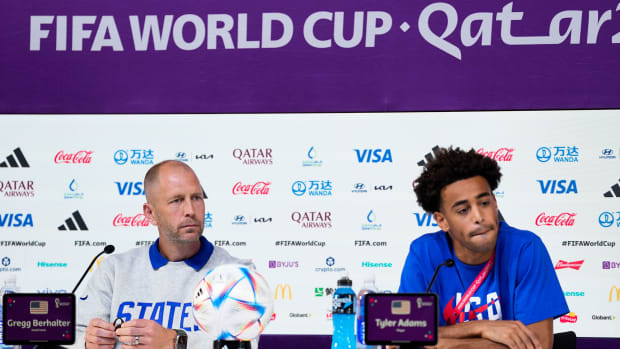
Ashley Landis/AP
Berhalter declined to comment on visas, battleships and Klinsmann. But he apologized on behalf of the team for the flag issue while trying in vain, at least in the moment, to bring attention back to the Group B finale.
“We had no idea about what U.S. Soccer put out—the [team] staff, the players had no idea and for us … our focus is on this match,” the manager said. “I don't want to sound aloof or not caring by saying that, but the guys have worked really hard for the last four years. You have 72 hours between [the] England and Iran [games], and we really are just focused on how to get past Iran so we can go to this knockout stage of the tournament.
“Of course, our thoughts are with the Iranian people—the whole country, the whole team, everyone. But our focus is on this match.”
Adams, the 23-year-old captain who handled the heat with laudable grace, added, “We support Iran’s people and Iran’s team. But that being said, we're laser-focused on this match, as they are as well. We know how important this is for the progress of our team and what we want to do to prove to our country how hard we’ve been working. And we know they want to do exactly the same.”
While Berhalter, Adams and their colleagues will have to hope the commentary and controversy, in combination with the massive stakes, don’t impinge on that laser focus, Iran is most definitely confronting the same. Its World Cup run has been chaotic. While the U.S. put together two pretty consistent performances in its first two matches, Iran was awful in a 6–2 capitulation to England and then excellent in a 2–0 dismissal of Wales. Those games were played under trying circumstances, as Team Melli is obviously well aware of what’s happening back home.
Players declined to sing the national anthem before the England game, and fans reportedly chanted slogans in support of the protesters. Captain Ehsan Hajsafi, a defender at AEK Athens, told reporters, "Before anything else, I would like to express my condolences to all of the bereaved families in Iran. They should know that we are with them, we support them and we sympathize with them.
"The conditions in my country are not good and the players know it also.”
Late Monday, CNN reported that the Iranian government has threatened Team Melli members’ families with “imprisonment and torture” if there are further behavioral issues.
All this, hours before the game of their lives. Iran has never advanced past the group stage of a World Cup.
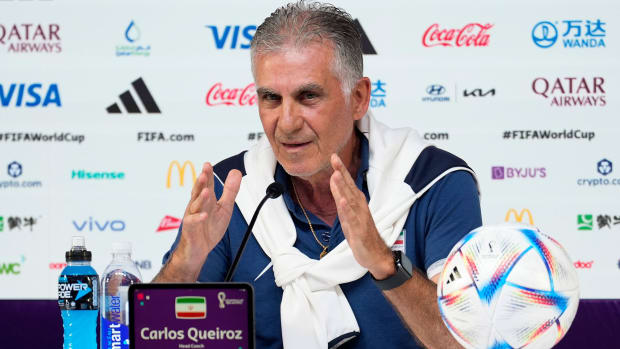
Ashley Landis/AP
Queiroz has been around, however. The eloquent 69-year-old Portuguese is coaching in his fourth World Cup. He’s managed seven different national sides, as well as both Real Madrid and Manchester United. A brief stint in charge of the New York Red Bulls (then MetroStars) in 1996 led to a consulting contract with U.S. Soccer that resulted in “Project 2010,” a plan to overhaul American youth development and infrastructure. The 2010 World Cup title didn’t materialize, but Queiroz remains an esteemed member of the coaching fraternity. He returned to the Iran job in September and has been trying his best to limit the distractions since. In his players’ case, those distractions can mean life or death.
Considering the context, Queiroz found U.S. Soccer’s flag gaffe—and a lot of the chatter overwhelming a World Cup that England coach Gareth Southgate called “the tournament of external noise”—mostly irrelevant. The match remains the priority, at least to those involved.
“If after 42 years in this game as a coach I still believe that I could win games with those mental games, I think I did not learn [anything] about the game. This is not the case,” Queiroz said Monday. “Those events that are surrounding this World Cup, I hope will be a good lesson for all of us in the future: that in the next event, we learn that our mission here is to create entertainment.
“If you talk about human rights, racism, kids that die in schools in shootings—we [feel] solidarity with all those causes,” he added. “But here, our mission is to bring the smiles for the people at least for 90 minutes.”
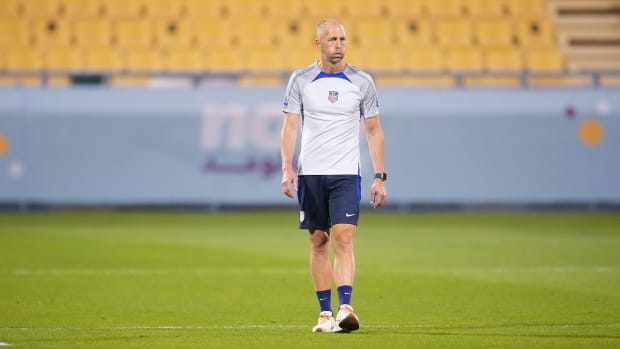
Ashley Landis/AP
A Team Melli win would send them to the round of 16 and eliminate the U.S., while a draw would be sufficient as long as Wales doesn’t upset England (a three-way tie would ensue). Iran puts in a full shift—its three second-half stoppage time goals are testament—and in Sardar Azmoun (Bayer Leverkusen) and Mehdi Taremi (Porto), it has the proven international goal scorers the U.S. still lacks.
"I think it's a really good team,” Berhalter said. “It’s gonna be [a] difficult game. Like I said, a knockout game. I think they're in a positive position only needing a draw, and we need to win. So it's going to be a challenging game.”
Adams said, “They continued to create chances and continued to fight. So it’s going to be a tough battle. We’re gonna have to have a lot of energy in this game and make sure that we’re mentally prepared.”
Queiroz was enthusiastic in his praise for Berhalter’s squad.
“Without any doubt in my opinion the most consistent and probably the team that made the best two performances in our group [is] the United States,” he said. “They played very well in the first game against Wales and very well against England. All the other teams, including our team, were not so consistent.
“We know the difficulties we have tomorrow,” he continued. “We play a very, very good team, very well organized, with the same dream, the same goal in mind.”
American consistency hasn’t led to American goals, however. The U.S. has managed just 1.4 expected goals across its two games, according to Tru Media, and put just three shots on target (both Josh Sargent and Christian Pulisic have struck woodwork). Advancement in Qatar depends on improvement, although Berhalter said Monday that he’s not interested in a last-minute attacking overhaul. Tactically, Iran looks more like Wales than England.
“For us, it's about how do we put our players in a position to create chances and get on the end of chances. We’ve been defending really well, and that keeps you in games, and then we know in this game, we’re going to need to score a goal,” Berhalter said.
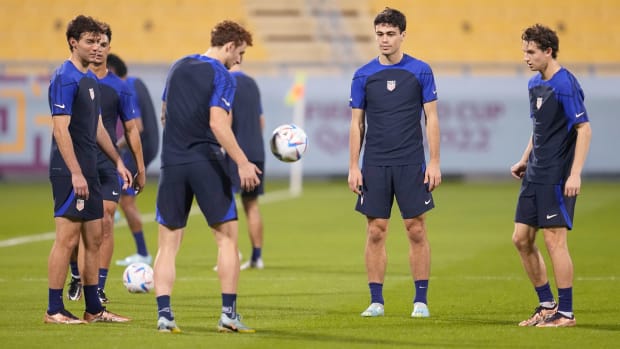
Ashley Landis/AP
He added that he's retained his faith in strikers Sargent, who started against Wales, Haji Wright, who started against England, and Jesús Ferreira. The notion of altering the striker’s positional profile to consider the likes of Pulisic, Tim Weah or Gio Reyna in the role was dismissed some time ago, which the U.S. manager reiterated Monday.
“It’s up to the rest of the group to give them quality service so that they can finish off some of these opportunities,” he said. “Hopefully in this Iran game, we can get some good balls into the box and help these guys out a little.”
The U.S. can still finish atop the group. A victory at Al Thumama, plus a Welsh upset of England, would lift the U.S. into first. If Wales and England draw, an unlikely U.S. win by five or more goals would also suffice. At this point, however, the Americans surely would be thrilled with any seed or opponent as long as it means a fourth game. There has been big-picture progress. There are U.S. players scattered across the UEFA Champions League and Europe’s Big Five domestic circuits. Valuation and scouting are increasing, and MLS academies are churning out talent that’s increasingly appealing to those at the sport’s highest level. And MLS itself continues to grow.
But the World Cup is the competition of record—it’s the milepost by which so much is measured. And Tuesday’s game is going to measure just about everything: quality, calm, ferocity and focus. It’ll determine what sort of noise surrounds U.S. Soccer, Berhalter and his team once this is all over.
For the manager, the mentality is where it needs to be. He remembers what bad intangibles looked like 22 years ago and he was part of a squad that got it right in South Korea four years later.
“What I see from the group is this tremendous amount of focus,” he said. “There’s no real distractions. And I know there's a lot going on here. But the group is focused on how we get a win. And it's been a pleasure working with this group for the last four years. There’s been a lot of growth within this group. And tomorrow's a great challenge for this group. And I'm really excited to see how we respond to that.
"We don’t want to make the same mistakes of the past. We want to learn from that and be able to put in a good performance.”







